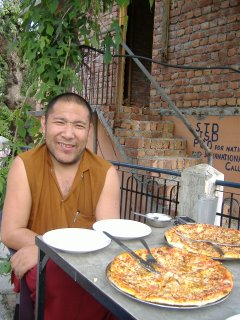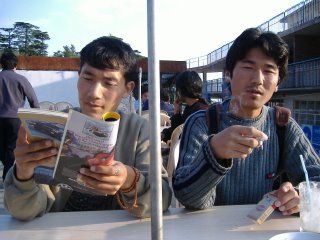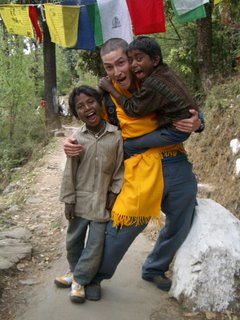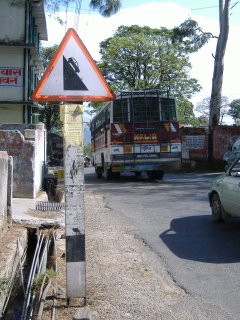
I revised my previous entry; I was way too harsh on Westerners wanting to give handouts to poor communities. There are
countless scenarios where donations to developing nations are desparately needed.
For example, one might say, "We have no business bringing money and technology into rural villages; these people live simple, peaceful, beautiful lives, who are we to march in and introduce our Western lifestyle?" Doctor Paul Farmer, international health superstar, calls this the "luddite trap," or, "good things for rich people and shit for the poor." (Luddite = someone who shuns/dislikes technology in favor of a simpler lifestyle.) Granted, there is some appeal to living in a hut on a tranquil farm with cows and wheat fields. The danger, however, is the tendency to romanticize this lifestyle. It's easy to see the beauty in a "simple life" when we have the freedom to choose between life in a hut, versus a life of convenience, medical care, video games and such.
On the other side of the coin, great care must be taken when introducing Western values/culture/technology to a developing community. History is chock full of horror stories wherein colonists force and/or coerce native peoples to adopt some useless crap way of life that winds up wiping out their entire culture.
One of the best litmus tests of a good "donation," I think, is one presented by Amartya Sen, author of
Development as Freedom: Let the people choose. Citizens should have the freedom to decide for themselves what sort of lifestyle they wish to lead. If an African village community requests
crank-powered laptops and better schooling so their children can get an education, more power to any organization who can help them achieve this goal! If the families in Charan ask for a medical clinic, by all means, let's help them stay healthy!
Perhaps I'm contradicting myself a bit, but issues like these are complicated, and I'm still sorting it all out for myself. The moral of my story, I think, is to help out wherever there is need, so as long as both parties are involved in deciding what help is truly needed, and care is taken to ensure a positive impact without creating dependency.
 Lobsang is the manager of Shangri-La, the tastiest, cheapest, most happenin’ monk hangout, restaurant and guest house this side of the Himalaya. I head there every morning for some honey curd, tofu spinach soup, banana crepes with peanut better and hot lemon honey ginger. Yes, I eat like a gluttonous cow. I am no longer a skeletal shade of my former self, and food, thankfully, has reconciled her differences with my belly.
Lobsang is the manager of Shangri-La, the tastiest, cheapest, most happenin’ monk hangout, restaurant and guest house this side of the Himalaya. I head there every morning for some honey curd, tofu spinach soup, banana crepes with peanut better and hot lemon honey ginger. Yes, I eat like a gluttonous cow. I am no longer a skeletal shade of my former self, and food, thankfully, has reconciled her differences with my belly.






